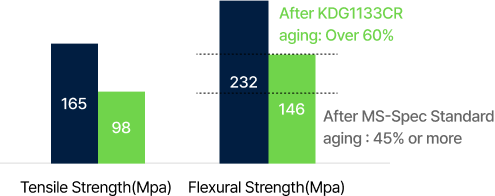Home
Chemical resistance is the property of withstanding chemical substances or chemical treatments. Materials without chemical resistance can melt or deform due to chemical substances, rendering them unable to perform their intended functions. However, materials with high chemical resistance can function properly even in environments exposed to strong acids and alkalis. In the case of automotive components, they possess chemical resistance that allows them to withstand exposure to various chemicals such as fuels, engine oil, antifreeze, and calcium chloride without any issues. In addition, chemical-resistant plastics can also be found in everyday items like containers for detergents and shampoos.
Characteristics
-
Excellent
Mechanical Properties -
Glycol-Resistant
-
Calcium
Chloride-Resistant
Applicable Areas
-
Automobile radiator upper and lower tanks
-
Other industrial applications
Certifications
Plastics commonly used for radiator tanks were vulnerable to chemical damage from antifreeze, leading to the development of KDG1133CR to address this issue. KDG1133CR exhibits excellent chemical resistance, effectively preventing radiator cracks and leaks caused by antifreeze (calcium chloride) and coolant (ethylene glycol). It also has high rigidity. KDG1133CR, a representative product with excellent chemical resistance, was developed jointly with Hyundai Motors and received recognition for its achievements, winning the Jang Yeong Sil Award jointly.


